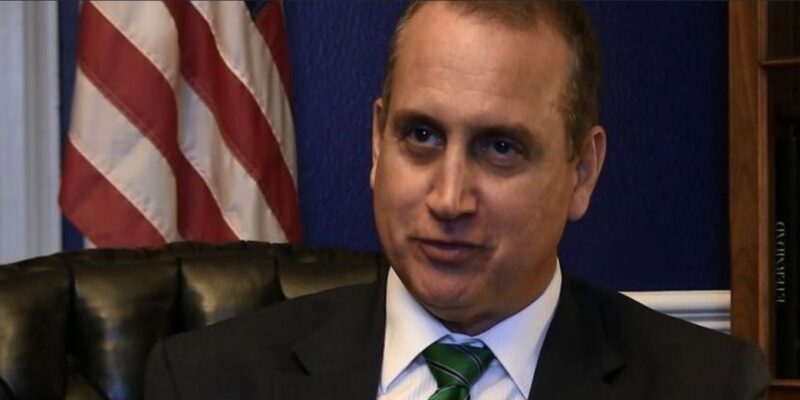The FY25 State, Foreign Operations, and Related Programs Subcommittee Appropriations bill has been released, and Republicans are throwing their support behind it. Florida Rep. Mario Diaz-Balart (R), the Chairman of the Department of State, Foreign Operations, and Related Programs Subcommittee of the House Committee on Appropriations, unveiled the bill this morning.
As the chairman, Rep. Diaz-Balart shared that the bill “builds on the policy wins of fiscal year 2024 enacted bill, particularly cutting wasteful spending by including a 19% reduction from the President’s budget, and an 11% reduction from fiscal year 2024 enacted levels.”
According to Rep. Diaz-Balart’s office, the bill will continue to establish American leadership “where it has been severely lacking,” citing the Biden Administration as contributing to this decline.
It will continue to uphold “key U.S. priorities by supporting allies such as Israel and Taiwan, and countering adversaries such as Communist China, the terrorist states of Iran and Cuba, and terrorist organizations such as Hamas and Hezbollah."
- Cutting to $7.6 billion (11%) below the Fiscal Year 2024 enacted level and $12.26 billion (19%) below the President’s Budget Request.
- Eliminating funding for the United Nations’ regular budget, resulting in savings of $761.6 million.
- Prohibiting funds for other controversial organizations and programs, such as UNFPA, the World Health Organization, and the Gender Equity and Equality Action Fund.
- Cutting 36 accounts in the bill to either at or below FY19 levels, or eliminating them entirely.
- Terminating more than 18 programs, including the Organization for Economic Cooperation and Development (OECD), the UN Educational, Scientific and Cultural Organization (UNESCO), UN Women, the UN Montreal Protocol, the UN Environment Fund, and the World Economic Forum.
- Prohibiting funding for Special Envoys, Special Representatives, Special Coordinators and Special Advisors unless such positions are expressly authorized or have been expressly approved by the Senate.
- Prohibiting funds for the Green Climate Fund, Clean Technology Fund, and Loss and Damages Fund.
- Prohibiting the Treasury Department from carrying out the Biden Administration’s climate agenda at the World Bank and other multilateral development banks, which harms developing countries and opens the door to predatory financing from the PRC.
- Prohibiting the Administration’s current practice of co-opting programming, such as that to empower women; advance democracy and freedom; or counter trafficking in persons, to advance its radical global climate change agenda.
- Prohibiting funds to the Wuhan Institute of Virology, the EcoHealth Alliance, any gain-of-function research, and labs in adversarial nations like China, Iran, Russia, North Korea, and Cuba.
- Prohibiting funding that encourages or facilitates irresponsible migration towards the U.S.-Mexico border; and
- Prioritizing funding and policies to combat the flow of fentanyl and other illicit drugs into the United States.
- Providing unwavering support for Israel by including $3.3 billion for the Foreign Military Financing Program;
- Prohibiting funding for the International Criminal Court, International Court of Justice, United Nations Relief Works Agency (UNRWA), and the United Nations Commission of Inquiry against Israel;
- Providing $2.1 billion for United States national security interests in the Indo-Pacific and to counter the PRC’s malign influence;
- Including $500 million in Foreign Military Financing Program for Taiwan to strengthen deterrence across the Taiwan Strait and up to $2 billion in loans and loan guarantees for such purpose;
- Fully funding the Countering PRC Influence Fund at $400 million;
- Prohibiting funds for the PRC and the CCP, prohibiting funds for countries to repay Chinese debt, and prohibiting funds for international financial institutions from loans to PRC; and
- Prohibiting the Iran Revolutionary Guard Corps from being removed from the Foreign Terrorist Organization (FTO) list and prohibiting funds to implement a nuclear agreement with Iran unless approved by the Senate.
- Promoting freedom in the Western Hemisphere:
- $35 million for democracy programs for Cuba;
- $50 million for democracy programs for Venezuela;
- $15 million for democracy and religious programs for Nicaragua.
- Requiring a pre-obligation report on the status of bilateral relations with the government of Colombia, including analysis of how the Petro Administration’s policies align with U.S. national interests.
- Maintaining all long-standing, pro-life protections;
- Applying the Protecting Life in Global Health Assistance Policy (expanded Mexico City Policy) on all health funds in the Act;
- Prohibiting funds to the United Nations Population Fund (UNFPA);
- Supporting religious freedom programs abroad and religious freedom protections for faith-based organizations delivering foreign aid;
- Prohibiting funds for the Arms Trade Treaty;
- Banning “disinformation” and “misinformation” programs that violate the free speech rights of Americans;
- Prohibiting funds for unnecessary regulations and controversial Executive Orders that disadvantage American businesses;
- Prioritizing diplomatic engagement to favorably resolve commercial disputes abroad and to promote American business interests overseas; and
- Refocusing attention on critical diplomatic functions, such as addressing the backlog of passport applications, and ensuring the safety and security of our embassies.
- Prohibiting funds to implement COVID-19 mask and vaccine mandates.








